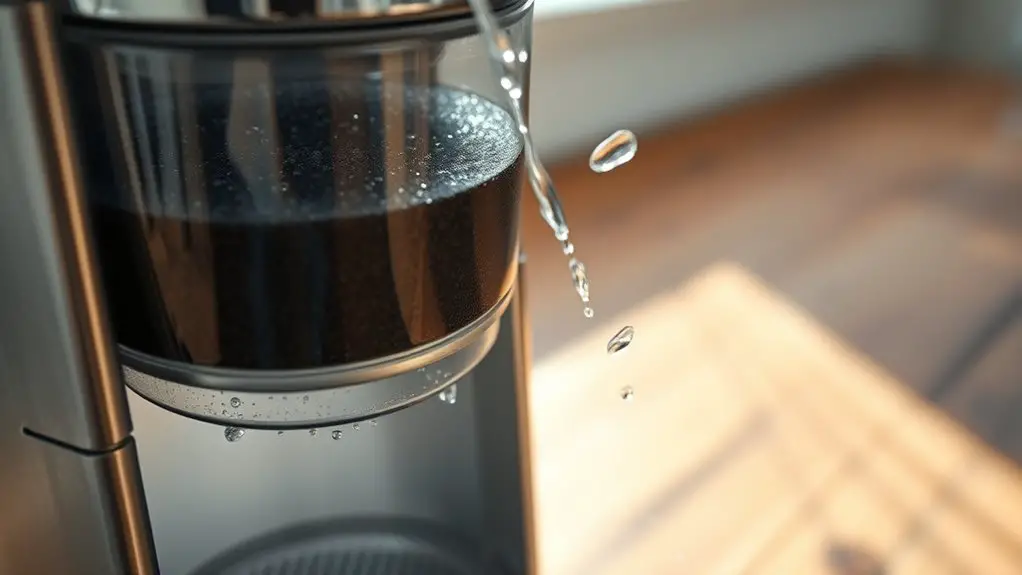To guarantee great-tasting coffee, consider a DIY water filtration system for your coffee maker. Start with activated charcoal to remove impurities, adding layers of gravel and sand for improved filtration. Use a clean container and a coffee filter to catch any remaining particles. Filtered water enhances flavor extraction and eliminates chemicals, leading to a richer brew. By optimizing your water quality, you can noticeably improve your coffee experience—there's more to explore about brewing techniques and ingredient choices.
The Importance of Water Quality for Coffee Brewing
When you brew coffee, the quality of the water you use can greatly affect the final taste of your cup. Water hardness, which refers to the concentration of minerals like calcium and magnesium, can influence extraction efficiency. If your water's too hard, it might lead to over-extraction, resulting in bitter flavors. Conversely, soft water can cause under-extraction, leaving your coffee weak and flat. Additionally, the brewing temperature plays an essential role; ideally, it should be between 195°F and 205°F. This range allows ideal extraction of flavors without scalding the coffee grounds. By understanding the interplay between water quality, hardness, and brewing temperature, you can elevate your coffee experience and take control of your brew, enjoying every sip. Regular descaling with professional solutions helps maintain your coffee machine, ensuring optimal performance and flavor extraction.
Materials Required for Your DIY Filtration System
Creating an effective DIY water filtration system for your coffee maker requires just a few essential materials. First, you'll need a charcoal filter, as it plays a vital role in removing impurities and improving water taste. Look for activated charcoal, which is particularly effective in this regard. Next, gather filtration materials, including a clean container to hold the filtering setup and fine mesh or cheesecloth to contain the charcoal. You might also consider adding layers of sand and gravel, which can enhance the filtration process. Having a funnel can facilitate pouring, ensuring you don't create a mess. With these materials, you'll be well-prepared to construct a water filtration system that enhances your coffee experience.
Step-by-Step Guide to Building Your Water Filter
Now that you have your materials ready, constructing your DIY water filter is a straightforward process. Follow these steps to guarantee effective filtering methods and enjoy the filtration benefits in your coffee.
| Step | Action |
|---|---|
| 1 | Layer activated charcoal |
| 2 | Add gravel for drainage |
| 3 | Include sand for sediment |
| 4 | Place coffee filter on top |
| 5 | Pour water through the filter |
Begin by layering the activated charcoal at the bottom of your container, then add gravel, sand, and finish with a coffee filter. This assembly captures impurities, enhancing your coffee's taste. By mastering this filtration system, you're reclaiming your water quality with freedom and simplicity.
Tips for Using Filtered Water in Your Coffee Maker
Using filtered water in your coffee maker can greatly enhance your brew's flavor and aroma. By eliminating impurities and chemicals commonly found in tap water, you'll notice the filtered water benefits, such as a smoother taste and a more vibrant coffee profile. To maximize these advantages, consider your brewing techniques. Whether you're using a pour-over, French press, or espresso machine, filtered water can improve extraction efficiency, leading to a richer cup. It's also essential to maintain the right water temperature—ideally between 195°F and 205°F—for peak extraction. Finally, clean your coffee maker regularly to prevent mineral buildup, ensuring your filtered water remains untainted. These simple steps can transform your daily coffee ritual into a delightful experience.
Enhancing Your Coffee Experience With Proper Filtration
Filtered water not only enhances the flavor of your coffee but also plays a significant role in the overall brewing experience. Using filtered water guarantees that impurities and minerals do not interfere with your coffee's true essence. This choice allows your brewing techniques to shine, bringing out the nuanced flavors of your beans.
| Water Quality | Effect on Coffee Flavor |
|---|---|
| Poor Quality | Bitter, Flat |
| Moderately Filtered | Balanced, Mild |
| Highly Filtered | Bright, Complex |
| Distilled | Lacks Depth |
Frequently Asked Questions
How Often Should I Replace My DIY Water Filter?
You should replace your DIY water filter based on filter longevity and your maintenance schedule. Generally, every 2-3 months is best, but if water quality declines, consider replacing it sooner for peak performance and taste.
Can I Use Bottled Water Instead of Filtered Water?
Imagine a river flowing smoothly; bottled water offers convenience and consistent taste, but its drawbacks include plastic waste and potential chemical leaching. Weigh these bottled water benefits against its environmental impact before making your choice.
Is Tap Water Safe for My Coffee Maker?
Tap water can be safe for your coffee maker, but its quality varies. Regular maintenance is essential to prevent mineral buildup. If your tap water's hard, consider a filtration system for ideal flavor and longevity.
Will Filtered Water Affect the Taste of My Coffee?
Filtered water can considerably enhance your coffee flavor by reducing impurities and adjusting water hardness. This balance helps extract the coffee's essential oils and flavors, resulting in a smoother, more enjoyable cup that truly expresses its characteristics.
What Additional Coffee Brewing Tips Can Enhance Flavor?
If you're seeking to elevate your coffee's flavor, consider experimenting with brewing temperature and grind size. The right balance can create depth in flavor, transforming each sip into a delightful experience that captivates your senses.
